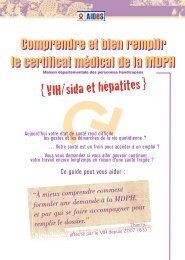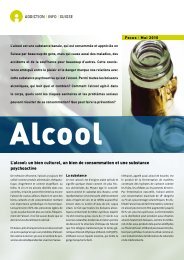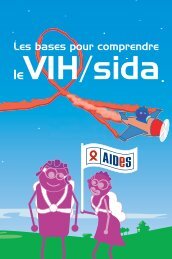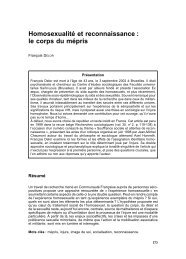Care and support for people living with HIV/AIDS
Care and support for people living with HIV/AIDS
Care and support for people living with HIV/AIDS
You also want an ePaper? Increase the reach of your titles
YUMPU automatically turns print PDFs into web optimized ePapers that Google loves.
Report on the global <strong>HIV</strong>/<strong>AIDS</strong> epidemic – June 2000Greater involvement of <strong>people</strong> <strong>living</strong> <strong>with</strong> <strong>HIV</strong>/<strong>AIDS</strong> – the GIPA principleIf anything, the involvement of <strong>HIV</strong>-positive <strong>people</strong> has become even more visible<strong>and</strong> credible since 1995. This is when the community stepped up pressure toincrease access to highly active antiretroviral therapy – in memory of those who hadnot survived long enough to benefit from it <strong>and</strong> out of solidarity <strong>with</strong> the millions whostill could not af<strong>for</strong>d it.Already in 1994, the GIPA principle was <strong>for</strong>mally enshrined in the Declaration signedby 42 nations at the Paris <strong>AIDS</strong> Summit. The signatory nations resolved to “<strong>support</strong>a greater involvement of <strong>people</strong> <strong>living</strong> <strong>with</strong> <strong>HIV</strong>/<strong>AIDS</strong> through an initiative tostrengthen the capacity <strong>and</strong> coordination of networks of <strong>people</strong> <strong>living</strong> <strong>with</strong> <strong>HIV</strong>/<strong>AIDS</strong><strong>and</strong> community-based organizations”.This resolution was prompted by recognition that these groups had played a leadershiprole in increasing society’s acceptance of those <strong>living</strong> <strong>with</strong> <strong>HIV</strong>, in reducingtheir peers’ infection rates, in mitigating the personal <strong>and</strong> social impact of the disease,<strong>and</strong> in fighting <strong>for</strong> their right to health care.Community st<strong>and</strong>ards <strong>for</strong> care <strong>and</strong> <strong>support</strong>Because community organizations play such an important role in care <strong>and</strong> <strong>support</strong><strong>for</strong> <strong>people</strong> <strong>living</strong> <strong>with</strong> <strong>HIV</strong>, they <strong>and</strong> their clients have a stake in how health sectorresources are allocated <strong>and</strong> distributed. Since 1997 UN<strong>AIDS</strong> has advocated thatcommunities, alongside other stakeholders, should be involved in developing st<strong>and</strong>ards<strong>for</strong> <strong>HIV</strong>-related care <strong>and</strong> <strong>support</strong>. The goal of this working partnershipbetween health planners <strong>and</strong> the local community (defined as a group of <strong>people</strong>sharing the same geographic, cultural <strong>and</strong> economic environment) is to reach a consensuson meeting the needs <strong>and</strong> expectations of <strong>people</strong> <strong>with</strong> <strong>HIV</strong> that is perceivedas equitable <strong>and</strong> responsive to other equally important needs.The process of discussing expectations <strong>and</strong> arriving at a consensus involves in<strong>for</strong>mingthe participants about what <strong>support</strong> <strong>and</strong> resources the health system can potentiallyprovide, sounding out the preferences of the community <strong>and</strong> identifying itspotential <strong>for</strong> contributing to care.Attempts to <strong>for</strong>mulate community st<strong>and</strong>ards <strong>for</strong> care <strong>and</strong> <strong>support</strong> have been completed<strong>with</strong> some success in Burkina Faso, the Central African Republic, Malawi <strong>and</strong>in Phayao Province in northern Thail<strong>and</strong>. The process is not always easy; the inadequacyof knowledge about health care can be a limiting factor, <strong>for</strong> example.However, the approach has enormous potential. Formulating community st<strong>and</strong>ardsmakes it possible to identify the resources <strong>for</strong> care already available in the community<strong>and</strong> to determine how they could be used to better effect through <strong>support</strong> fromthe <strong>for</strong>mal health system. It also breaks the silence surrounding <strong>HIV</strong> <strong>and</strong> discouragesdiscrimination by sending the message that <strong>people</strong> <strong>with</strong> <strong>AIDS</strong> have a claim on solidarity<strong>and</strong> <strong>support</strong>.88











